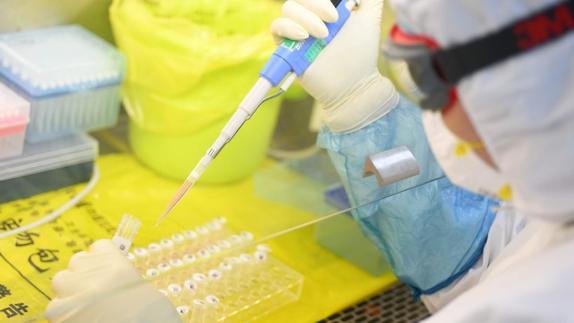 A medical worker tests novel coronavirus samples at the Fire Eye lab in Wuhan, Hubei province, on Feb 6, 2020. (ZHOU CHAO / CHINA DAILY)
A medical worker tests novel coronavirus samples at the Fire Eye lab in Wuhan, Hubei province, on Feb 6, 2020. (ZHOU CHAO / CHINA DAILY)
Two patients in China that recovered from COVID-19 months ago tested positive for the coronavirus again, raising concern of the virus’ ability to linger and reappear in people who it previously infected.
A 68-year-old woman in Hubei tested positive again six months after her first infection while an asymptomatic man was diagnosed in Shanghai after his previous infection in April
A 68-year-old woman in the central Chinese province of Hubei, where the novel coronavirus first surfaced in December, tested positive on Sunday, six months after she was diagnosed with COVID-19 and recovered. Another man found to have contracted the disease in April after returning from abroad tested positive in Shanghai on Monday but hasn’t shown any symptoms.
ALSO READ: 19 new cases on mainland, virus detected in Brazil meat product
None of the patients’ close contacts has tested positive for the virus, but they have been placed under quarantine, local authorities said.
The two cases are the latest addition to a growing number of “virus reactivation” anecdotes found among patients believed to have recovered from the viral infection, which has sickened more than 20 million worldwide and killed 748,000. While it is rare for recovered patients to test positive again, the phenomenon raises questions over why some patients suffer from long-term symptoms, and whether any immunity to the disease might be too ephemeral to protect against re-infection.
Some studies have shown the level of protective antibodies an infected person may build up to fight the virus quickly drop after only a few months, possibly making them susceptible to the same pathogen a second time. However, there is little evidence so far that re-infection has been occurring in this pandemic.
Some experts have raised the possibility that other cells continue to provide immunity even after antibodies fade. Researchers in South Korea have suggested that the virus detected in patients months after recovery could be the vestiges of dead virus particles that are no longer infectious.
READ MORE: S. Korea study: Post-recovery virus relapse not infectious


